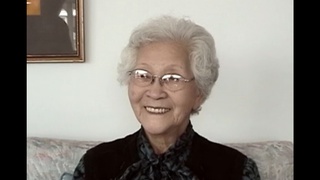Interviews
Difficulties understanding different Japanese dialects
I am familiar with Hiroshima because everybody talked like that and I grew up with that so I learned, I thought it was part of a standard Japanese until go to school, went to school and then there was local dialects and the book, my nephew just made it; it's all this Japanese slang and especially local slang. I don't think anybody other than Hiroshima people understand that and not the standard Japanese, with mixed Japanese and that's somewhat familiar to me. Some of 'em I just learned, new things and that's what older people talk about. So, go different places, there different people talk but I didn't pay much attention to. But most of 'em here it was like a Kyushu dialect such as Fukushi-, I mean as Fukuoka, Saga and some Nagasaki and some Kumamoto and I have experience with Kuma-, I mean, Kagoshima, Mr. Yamaguchi was a Kagoshima and they talk I don't completely understand so I don't even care to write it down because they strictly different even though same island, Kyushu. But when they spoke in standard Japanese, very nice and I appreciated.
Date: December 17 & 18, 2003
Location: Washington, US
Interviewer: Alice Ito, Tom Ikeda
Contributed by: Denshō: The Japanese American Legacy Project.
Explore More Videos

Little interaction with parents
(1926 - 2012) Scholar and professor of anthropology. Leader in the establishment of ethnic studies as an academic discipline

Lack of language skills
(b.1964) California-born business woman in Japan. A successor of her late grandmother, who started a beauty business in Japan.

Acculturation
(b.1964) California-born business woman in Japan. A successor of her late grandmother, who started a beauty business in Japan.

Japanese are more accustomed to foreigners
(b.1964) California-born business woman in Japan. A successor of her late grandmother, who started a beauty business in Japan.

Teaching at the military language school during World War II
(b. 1924) Political scientist, educator, and administrator from Hawai`i

Learning English upon discovering that family could not return to Peru
(1930-2018) Nisei born in Peru. Taken to the United States during WWII.

Playing baseball along with American Nisei and Kibei
(1930-2018) Nisei born in Peru. Taken to the United States during WWII.

Witnessing the atomic bombing of Hiroshima
(b. 1927) Japanese American Nisei. Family voluntarily returned to Japan during WWII.

Her early life in Canada
(b.1912) Japanese Canadian Issei. Immigrated with husband to Canada in 1931

Japanese school
(b.1924) Japanese Canadian Nisei. Interpreter for British Army in Japan after WWII. Active in Japanese Canadian community

Learning Japanese at school and at home with family
(b.1951) Co-founder and managing director of San Jose Taiko.

Results of being more American than Japanese
(1924-2018) Researcher, Activist

Going to Japanese school
(1923-2011) Lawyer, MIS veteran, founder of Francis and Sarah Sogi Foundation

Volunteering to serve for the U.S. military in Japan
(1923-2011) Lawyer, MIS veteran, founder of Francis and Sarah Sogi Foundation

Feeling closer to Japan as a Japanese American
(1923-2011) Lawyer, MIS veteran, founder of Francis and Sarah Sogi Foundation
